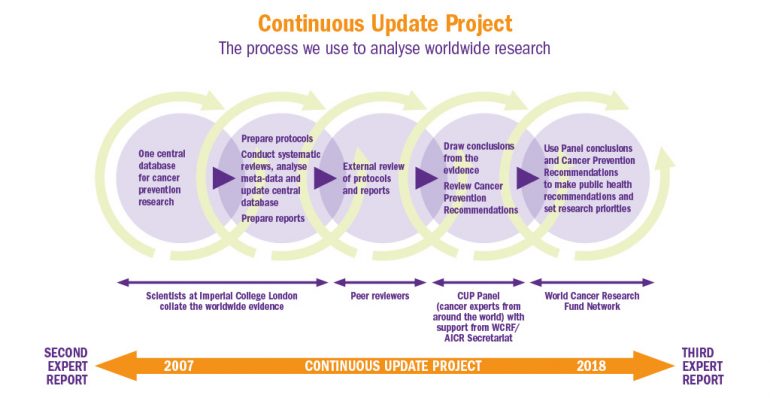
Have you seen this report?

10 Jul 18 |
As many of our regular readers know, the World Cancer Research Fund (WCRF) Network has an ongoing programme of research evaluation looking at the evidence for cancer prevention and cancer survivorship related to diet, nutrition and physical activity. This programme has produced the series of Continuous Update Project (CUP) Reports on 17 specific cancers and cancer survivorship published over the last ten years. The CUP database, held and systematically reviewed at Imperial College London, is constantly being added to and then assessed by an
expert panel to produce updated cancer prevention recommendations. In May the WCRF published its Third Expert Report, Diet, Nutrition,
Physical Activity and Cancer: a Global Perspective (available from www.dietandcancerreport.org).
So what is different in this report?
• The greater number and quality of studies included in the review gives greater confidence in the accumulated evidence.
• Improved statistical approaches are possible on the greater accumulated evidence to allow for subgroup analyses and identification of
thresholds or plateaus i.e. the level of exposure below which there is no evidence of association with cancer risk and above which there
is. Emerging evidence for fruit and vegetable consumption indicates that most gain in terms of cancer risk is for people eating little or no fruit and vegetables rather than those eating one or two.
• A more holistic approach to the WCRF recommendations for cancer prevention is recognised as being more beneficial, although adhering to specific recommendations will confer some cancer prevention. There is good evidence that the more recommendations people adhere
to the lower their risk of developing cancer. Recommendations should therefore be regarded as a package or lifestyle.
• More evidence is emerging on cancer subtypes which allows for analysis of the association between exposures and the risk of specific cancer
subtypes.
• Evidence of the importance of following cancer prevention recommendations across the life course are emerging. Adult height, a marker for developmental growth and metabolic programming from conception onwards, is becoming more apparent. This is an area earmarked as of importance for future research.
